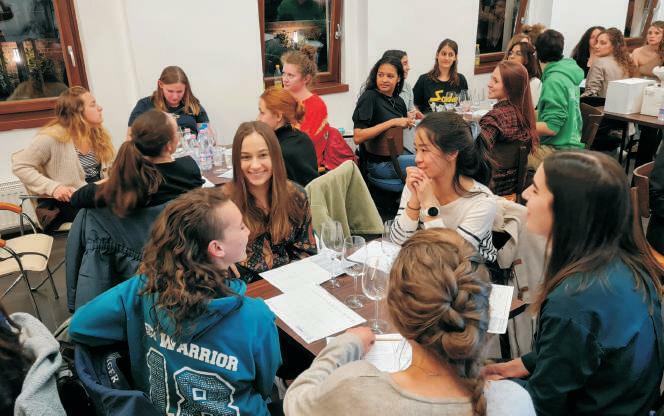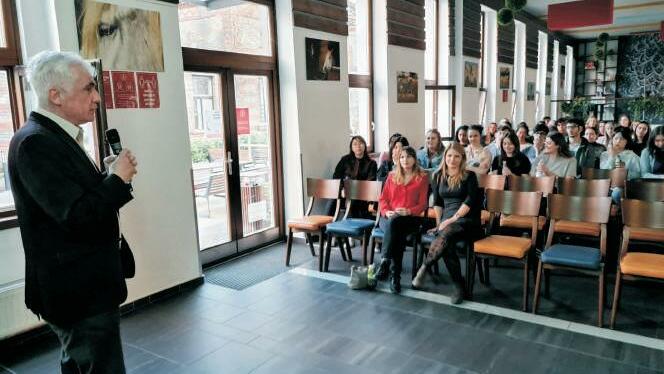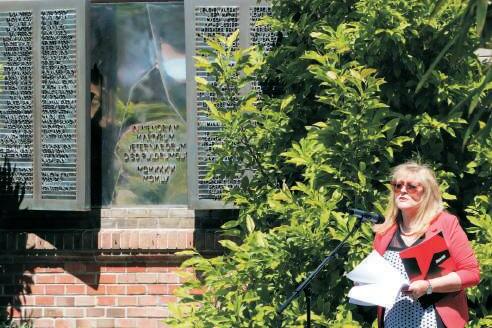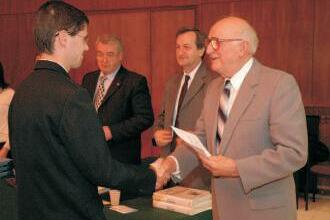
7 minute read
Career Day in the Student Center The 25th Graz conference
Hungarians in the world
Life teaches us to avoid any excess of superlatives. We are expected to learn our place in the world. As a result, we often measure our words carefully, almost like balancing all the “pros and cons” on a pharmacy scale. This time however, I will just say it's great to be a Hungarian! The memorial meeting held on 19 May in the honour of Dr. Ferenc Kovács, a Member of the Academy of Sciences and UVMB's Rector for three terms confirmed for me how right the poet Mihály Vörösmarty was when he wrote: “Here you must live and die.” The poet was referring to much more than our existence. Our environment and our circumstances have an enormous impact on the opportunities our life offers, but it is us who can, depending on our abilities and will, do “ something” with the “space given by our fate”, to quote another poet, Sándor Petõfi. The speakers of the memorial meeting talked with great respect about Professor Kovács, the scientist, the university builder, the education organizer as well as the six decades he spent at Animal Hygiene Department as the first head of the unit. We were given an insight into the efforts of this dedicated community and the newest laboratory of the Department of Animal Hygiene, Herd Health and Mobile Clinic, as it is called today. The author of this article was touched the most by the speech of , the president of the Dr. Jörg Hartung International Society for Animal Hygiene (ISAH). Throughout his speech, I had this feeling that it was indeed great to be a Hungarian! Where did this feeling come from? The professor of the University of Veterinary Medicine Hannover came to Budapest to tell us how concerned Professor Ferenc Kovács had been about the concentration and specialization of intensive animal farming since the mid 1950s. Having observed the increased frequency and incidence of multifactorial livestock diseases causing significant damage to the economy, he concluded that veterinary training institutions needed a science specialized in disease prevention to support animal health and welfare. He believed that the discipline should also be represented by an international organization where knowledge, ideas and skills can be shared. Diseases are a grave violation of animal integrity and dignity. The Professor focused on disease prevention. The society's foundation was initiated by Dr. Ferenc Kovács in 1967. The charter was signed in Budapest on 20 November 1970. The founding members were experts from Austria, Bulgaria, Czechoslovakia, Yugoslavia, Poland, Hungary, the German Democratic Republic, the German Federal Republic, the Soviet Union and Sweden. Dr. Jörg Hartung used a slide show to illustrate his presentation. The slide with the list of founding member states also showed an image of the Berlin Wall to remind the audience of Europe's division at the time. Yes, it was a special achievement in that era to establish an international professional organization that functions to this day. The ISAH's 20th congress will be held in Berlin in October. As of today, the organization has 52 member states. s a Hungarian citizen, the Hanoverian scientist's words made me very happy: “Professor Kovács was an outstanding European researcher, a greatA Hungarian, a mentor and a friend. We will always remember him as a visionary scientist and personality. His memory will remain in our thoughts and hearts.” Gusztáv Balázs
Advertisement

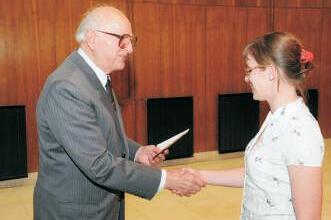
"DR. FERENC KOVÁCS PROFESSOR EMERITUS AWARD. For the fifth year, Member of the Hungarian Academy Dr. Ferenc Kovács presented the Dr. Ferenc Kovács Professor Emeritus Award founded by the Professor with a grant of HUF 400,000 per year", Dr. Péter Sótonyi announced in Issue 11/2009 of the Szent István University Magazine. "In 2005 and 2006, the award was presented in the campus during the Equus Days event organized by the students of the veterinary medicine faculty of Szent István University. Each year, the award was given to two students who achieved excellent academic results and were active in the sports and public life of the university as well. Since 2007 the ceremony has been held as part of the Conference of Student Research Societies, while the award criteria were extended to also include excellent performance in the Research Societies. As a result, the Veterinary Faculty's most prestigious student award was presented to four students in 2007, 2008 and 2009." Pictures: Professor Kovács presents the award to the best students in 2007, 2008 and 2009.
Conversation with Professor Gábor Bodó "If you're not afraid of horses, they'll take care of you"
Back when Professor Gábor Bodó was sitting at the desks of the University of Veterinary Medicine Budapest, the streets leading to the campus were still loud with clipclopping hooves, as the Big Animal Clinic used to be in the heart of the Elizabethtown district. On the other hand, the Hortobágy region was also represented there in the form of Csatlós, the famous Hungarian grey bull, whose statue was erected at the request of Professor Imre Bodó , the father of our interviewee. The head of the Equine Medicine Department and Clinic is one of those teachers who are tied to the Alma Mater through their family roots, too. His story is engaging and his achievements, made together with h i s e x c e l l e n t c o l l e ag u e s, a r e impressive. Here's an excerpt from the interview.
– Professor, how would you summarize the first twenty years of your life?
GUSZTÁV BALÁZS
– My life situations in this period determined my future path, just like it did for so many other people. I spent my first five years in Hortobágy, the great Hungarian plains. Animals were a part of our daily lives, since my father worked as a director of animal husbandry. The horses used to graze right next to our fence. When I was two, one day I set out on a journey and fell into a ditch the workers had just dug between the barn and our house. They picked me up and put me over to the other side. I went on, and my family later found me among the horses after an intensive search. If you're not afraid of horses, they'll take care of you. You can crawl around under their bellies. Since there were seven of us, siblings, my parents decided to move to Budapest in the 1970s to make sure we could go into higher education. The years spent in Máta stay with all of us forever as a beautiful memory. As a formative experience of my high school years, I had a lot of success as a junior dressage rider in the national team and a show jumper as ' student.
– He graduated from there, too, but first he studied in the Kõszeg cadet school, where he was taken as a prisoner of war at the age of 13. He got back from Garmisch-Partenkirchen... My two brothers and I got our A-levels from the Piarists, too. By then, I had already made up my mind about my
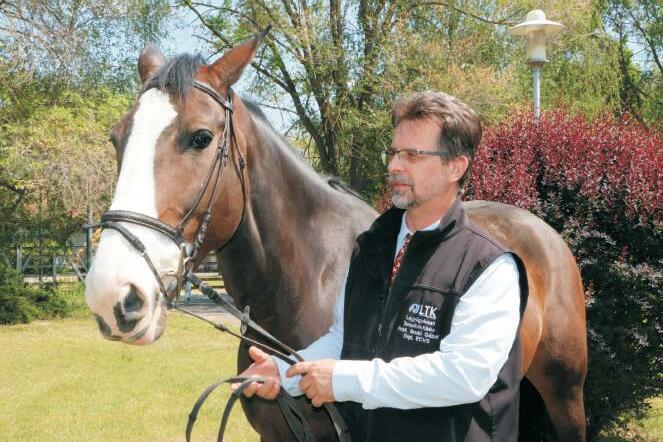
"Patient numbers have shown an annual growth of 15-20% in the clinic over the past 5 years, which is primarily due to the increasing quality of professional care and services as well as the significant investments conducted in the previous year"
Gyula Dallos
– Your father was also born in the capital city, and then studied at the Piarists. career. During my early dressage rider years, my horse, a Gidran stallion called Ganges, got lame. My juvenile critical attitude to the existing rudimentary options gave me the idea that I could do it differently. That's when I decided to become a horse surgeon.
– When Ganges got lame, Hungary hardly even had any X-ray equipment yet. Vets often relied on their intuition back then. Owing to its cooling effect, a clay pack can be a good idea for a fresh sprain, but without an accurate diagnosis it was rather just a stab in the dark. Patient numbers have shown an annual growth of 15-20% in the clinic over the past 5 years, which is primarily
– How much progress has the world made in terms of treating lameness since then?


